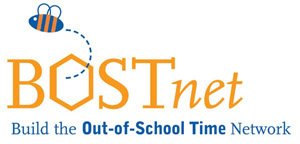
The other day the BE SAFE collaborative had their first annual meeting. BE SAFE is a group that wants to "maximize the ability of OST programs to provide positive environments for youth." This is very much a push to use OST programs as good places of social-emotional support and a means to train staff at these programs to talk about issues they may not feel confident in discussing because of a lack of knowledge or perhaps are afraid to address because of our litigious culture of liabilities and opposing cultural viewpoints. Whatever the quality of work of BE SAFE is not under review here.
What is of interest at the BE SAFE event was the group assembled on "stage" and in the room. Be SAFE appears to give simple tools that anyone who enters youth development can use. These resources are not intended to make any youth workers experts in the field of mental health but to allow them to respond to young people's needs with professional level supports. Increasingly, thought leaders and policy advocates are discussing a "star system" for program quality. One proposal floating out there is to get more staff certified or credentialed. This may require staff to commit to a regime of college classes, 45 hours or community training, professional observations, interviews, a portfolio or at least attend 5 - 40 hours of "orientation training" before their first day of work. While we want workers to be competent, can we create a competent workforce that understands the temporary nature of our workers and the limited resources of time and money for the field of OST?
The BE SAFE panel was a very diverse group of youth workers from all ages and backgrounds. A representative from a reproductive rights organization, the head of a sports/academic program - a former principal - two youth leaders, a teen center head, a representative from a domestic violence prevention organization, and a farmer.
Yes. A farmer.
This farmer, we will call her Jane the Farmer with a wink to the spirit of recent media events, had a background in organic farming. She did not think she had what it took to work with young people but seemed to have done such a good job in her short time in the field that she was featured on this panel. The organization she works for has youth development as a key aspect of their work, but it is not the only part of her organization's responsibility. Running a farm seems the primary activity. Yet, Jane the Farmer was a youth worker. OST gains an individual with knowledge of a much different field - no pun intended - and brings with her all sorts of content knowledge she and can share that with young people. In a season's time or two, she may leave youth work for more intensive farming or private farming whatever her life goals may be. In the meantime, youth benefit and the OST field of researchers, arts education specialists, inclusion specialists, and executive directors has a farmer working along side them.
OST programs need to be seen as quality programs for youth development. Professional development is a key to providing these quality services since competent staff are the life of any program. However, there needs some way to achieve this quality without closing the gates of youth development to those who can afford to commit to certificates that may take months or years. Considering that youth development work pay for direct service falls roughly between $8.25 - $11 an hour and that even program directors/coordinators may earn around $21,000 per year, are there ways of getting people to learn skills while they work? Credentials seems like an expensive and potentially risky solution. It follows the path set by colleges and universities rather than service economy jobs. The "pass/fail" certification process itself has currently only produced only 13 accredited programs within Massachusetts. Would credentials and certification of workers have a similar bottle neck effect?
Would a certification process following traditional "school of education" models prevent her and people like her from entering the field? Can the field be permeable to these skilled and caring individuals or must we close ranks as teachers have in creating their own system of "closed shops"? Upper level OST leaders may think certification will elevate the field. It may. It may also lead to a more organized workforce, and perhaps workers who cost more than the current rate of pay - robbing us of temporary talent and meaningful jobs that hire from and serve very local communities.




No comments:
Post a Comment